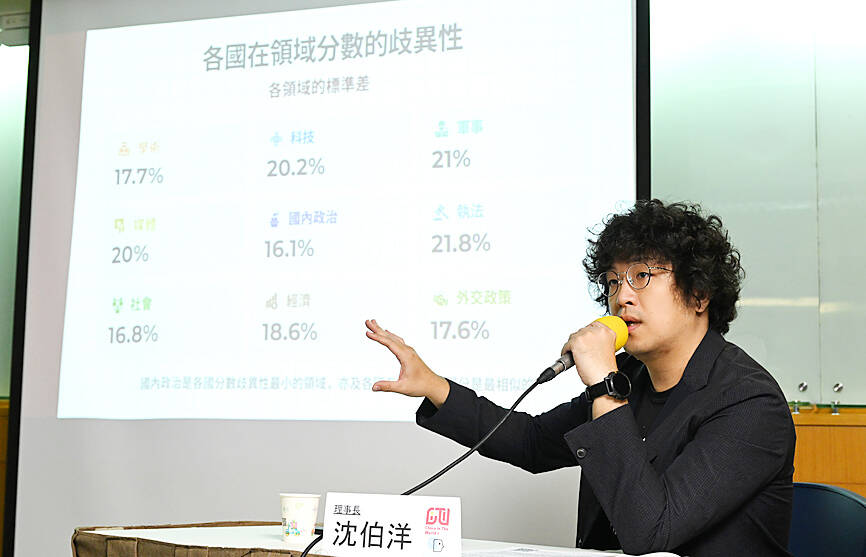China has stronger influence over Taiwan’s media and society than any other country, the Taipei-based Doublethink Lab think tank said yesterday, as it announced its China Index gauging Beijing’s global influence.
Taiwan ranked 11th overall among 82 countries assessed, but first in terms of social and media influence, Doublethink Lab chairman Puma Shen (沈伯洋) told a news conference in Taipei.
More than 200 experts and academics participated in the project, including some highly influential figures, Shen said.

Photo: Liao Chen-huei, Taipei Times
The index collects information from countries worldwide to gauge China’s influence and assess how Chinese policies affect them, Shen said.
In terms of Chinese influence in academia, the US ranked first, while other US sectors are affected by China’s efforts to weaponize trade, Shen said, adding that European nations, which have established measures to combat Chinese influence, are among the least influenced.
Beijing attempts to extend its influence through manipulation of the media and academic interaction, as well as trying to coerce other nations to adopt foreign policy goals in its favor after their economies have become reliant on China, Shen said.
These acts are part of Beijing’s objective to create a new world order under the “Chinese model,” which runs contrary to the rule of law concept embraced by the West, Shen said.
Pakistan, Cambodia, Thailand and other Asian countries are heavily affected by China in the fields of economy and technology, Shen said.
The index was also referenced in the “China’s Global Influence and Interference Activities” hearing on Thursday at the US-China Economic and Security Review Commission, an independent US government agency.
Taiwan, which has resisted such influence by introducing flexible policies, was invited to the hearing to share its experience and provide suggestions on resisting China’s influence, Shen said.
The US executive branch should counteract China’s manipulation and propagation of false information so that Washington can remain in a global leadership position, Shen said.
Taiwan and the US should consider establishing a joint center of excellence to draft policies to combat Chinese influence, as well as international standards to resolve the spread of false or manipulative information, Shen said.

TRAGEDY STRIKES TAIPEI: The suspect died after falling off a building after he threw smoke grenades into Taipei Main Station and went on a killing spree in Zhongshan A 27-year-old suspect allegedly threw smoke grenades in Taipei Main Station and then proceeded to Zhongshan MRT Station in a random killing spree that resulted in the death of the suspect and two other civilians, and seven injured, including one in critical condition, as of press time last night. The suspect, identified as a man surnamed Chang Wen (張文), allegedly began the attack at Taipei Main Station, the Taipei Fire Department said, adding that it received a report at 5:24pm that smoke grenades had been thrown in the station. One man in his 50s was rushed to hospital after a cardiac arrest

A car bomb killed a senior Russian general in southern Moscow yesterday morning, the latest high-profile army figure to be blown up in a blast that came just hours after Russian and Ukrainian delegates held separate talks in Miami on a plan to end the war. Kyiv has not commented on the incident, but Russian investigators said they were probing whether the blast was “linked” to “Ukrainian special forces.” The attack was similar to other assassinations of generals and pro-war figures that have either been claimed, or are widely believed to have been orchestrated, by Ukraine. Russian Lieutenant General Fanil Sarvarov, 56, head

SAFETY FIRST: Double the number of police were deployed at the Taipei Marathon, while other cities released plans to bolster public event safety Authorities across Taiwan have stepped up security measures ahead of Christmas and New Year events, following a knife and smoke bomb attack in Taipei on Friday that left four people dead and 11 injured. In a bid to prevent potential copycat incidents, police deployments have been expanded for large gatherings, transport hubs, and other crowded public spaces, according to official statements from police and city authorities. Taipei Mayor Chiang Wan-an (蔣萬安) said the city has “comprehensively raised security readiness” in crowded areas, increased police deployments with armed officers, and intensified patrols during weekends and nighttime hours. For large-scale events, security checkpoints and explosives

PUBLIC SAFETY: The premier said that security would be tightened in transport hubs, while President Lai commended the public for their bravery The government is to deploy more police, including rapid response units, in crowded public areas to ensure a swift response to any threats, President William Lai (賴清德) said yesterday after a knife attack killed three people and injured 11 in Taipei the previous day. Lai made the remarks following a briefing by the National Police Agency on the progress of the investigation, saying that the attack underscored the importance of cooperation in public security between the central and local governments. The attack unfolded in the early evening on Friday around Taipei Main Station’s M7 exit and later near the Taipei MRT’s Zhongshan